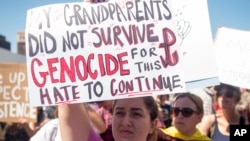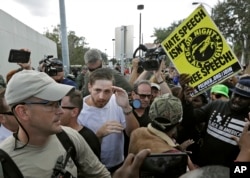Student Union
- By Julian Nazar
Where One Hears Free Speech, Another Hears Hate Speech

College students and educators continue to struggle with balancing free speech rights on campus while keeping debate from turning violent as a new school year approaches.
In the United States, the free exchange of ideas is the bedrock of college campuses. But avoiding violence -- like the deaths of three people in Charlottesville, Virginia near the University of Virginia a year ago during a protest over race -- shows the difficulty in keeping debate from turning into a brawl.
Hate speech should not be protected, say many students.
When a speaker like Charles Murray at the University of Michigan attributes class differences in America to genetic superiority, they say a line is crossed from speech to propaganda. Ideas that have little basis in science or scholarly research shouldn’t be on the same stage as valid research, they said.
“His views on race, intelligence, and inequality are hateful and archaic," argues Isaac Whitcomb, a rising junior at American University.
“Protesters believe that hosting speakers with white nationalist views legitimize those views,” says Rebecca Buckwalter-Poza, judicial affairs editor at the liberal news blog Daily Kos. “Some students feel that silence implicates them, or at least signals that they condone racism.”
Students say they know the difference between hate speech and free speech, and don’t want hate spread on campus. A 2016 Gallup poll found that nearly 70 percent of students said they believed universities should restrict speech that was “intentionally offensive to certain groups.”
And among the 1,500 undergraduate students surveyed by the Brookings Institution in August 2017, 51 percent thought it was fine to loudly and repeatedly disrupt a “very controversial speaker” ... “so the audience cannot hear him or her.”
On some campuses, officials have tried to maintain the peace by creating “free speech zones,” designated for unrestricted speech - some inside fences. Los Angeles Pierce College, Ohio University, Wichita State University, Modesto Junior College are a few schools to establish those zones.
Outside the “free speech zones,” those discussions and activities are prohibited. The legality of these zones has been questioned.
In "University of Cincinnati Chapter for Young Americans v. Williams," the federal district court ruled that the university’s free speech zone, which was less than .01 percent of the entire campus, was in violation of the First Amendment. The court found the university failed to demonstrate a compelling interest in justifying the exclusion of free speech activities from other areas on campus.
The southern state of Georgia in May became the 10th state to pass legislation outlawing free speech zones on college campuses. The other states are Florida, Virginia, North Carolina, Missouri, Kentucky, Arizona, Utah, Colorado, and Tennessee.
On the other side is the call for unrestrained freedom of speech on college campuses.
"There are absolutists …who argue freedom of speech is the cornerstone of our democracy," said Mary Beth Leidman, a professor of communications media and media law at Indiana University of Pennsylvania, referring to the advocacy rights group American Civil Liberties Union and the late Supreme Court Justice William O. Douglas. They have advocated that "the absolute freedom of speech must be protected absolutely,” Leidman said.
Lost in the discussion about unfettered freedom of speech is the 1977 Supreme Court decision, "National Socialist Party of America v. Village of Skokie." The nationalist party promoted a Nazi and anti-Semitic platform, and despite attempts by Skokie, Illinois, to restrict the group, the court ruled it could march in the predominately Jewish town, north of Chicago. All speech is free speech, the court ruled.
Many people are unaware of that decision, says Howard Gillman, chancellor of the University of California-Irvine, because, “Not a lot of civics teaching [is] going on in high school,” or students would know that hate speech is protected under the First Amendment.
There are exceptions to First Amendment protections. Libel, or false statements that injure a person’s reputation, is an exception. Incitement, which is speech that intentionally advocates imminent lawlessness, is another caveat.
“For example, talking to an enraged mob outside a building an urging them to burn it down. That would be punishable,” says Volokh.
But hate speech isn’t measured only as a constitutional issue.
“Hate speech can make you feel threatened of your existence,” Alejandrina Guzman, student government president at University of Texas-Austin. “When you already feel that you don’t have adequate resources or have the adequate personnel on campus to navigate those conversations, it’s threatening.”
Following events in which a campus speaker negatively impacts certain students, “administrators need to provide official platforms to show they care,” Guzman says.
Universities find themselves in a tough place when a campus speaker is found offensive by some students. Any condemnation made by the university runs the risk of alienating a part of its student body.
“Universities should only speak out when the core values of their institution are threatened,” Gillman advises.
Stephen Hayes, editor in chief of The Weekly Standard, says curbing any speech goes in the wrong direction. “More speech is the best antidote to hate speech,” he says.
See all News Updates of the Day
- By VOA News
Competition grows for international students eyeing Yale

It’s tough to gain admission to Yale University, and it’s getting even tougher for international students as standout students from around the world set their sights on Yale.
The Yale Dale News, the campus newspaper, takes a look at the situation here.
- By VOA News
Student from Ethiopia says Whitman College culture made it easy to settle in

Ruth Chane, a computer science major from Ethiopia, writes about her experiences settling into student life at Whitman College in the U.S. state of Washington.
"The community at Whitman College made sure I felt welcomed even before I stepped foot on campus," she says.
- By VOA News
Claremont Colleges student gets a shock when she heads home to Shanghai

In The Student Life, the student newspaper for the Claremont Colleges, a consortium of five liberal art colleges and two graduate schools in Claremont, California, student Rochelle Lu writes about readjusting to her Shanghai home after spending a semester in the United States.
- By VOA News
Cedarville University aims to ease transition for international students

Cedarville University in the U.S. state of Ohio says it’s got more than 140 international students representing 44 countries.
Here, the school interviews Jonathan Sutton, director of international student services. He talks about his job and the opportunities for international students on campus.
- By VOA News
Morehouse College offers prospective students tips on applying and thriving

Morehouse College, a private, historically Black liberal arts college in the U.S. state of Georgia, offers a guide for international students interested in attending the school.
Among the tips to apply and thrive at Morehouse:
- Take advantage of the school’s orientation program
- Turn to the school’s Center for Academic Success for tutoring, support and more
- Immerse yourself in campus life via clubs and societies
- By Reuters
US reviews Columbia University contracts, grants over antisemitism allegations

The administration of President Donald Trump said on Monday it will review Columbia University's federal contracts and grants over allegations of antisemitism, which it says the educational institution has shown inaction in tackling.
Rights advocates note rising antisemitism, Islamophobia and anti-Arab bias since U.S. ally Israel's devastating military assault on Gaza began after Palestinian Hamas militants' deadly October 2023 attack.
The Justice Department said a month ago it formed a task force to fight antisemitism. The U.S. Departments of Health and Education and the General Services Administration jointly made the review announcement on Monday.
"The Federal Government's Task Force to Combat Anti-Semitism is considering Stop Work Orders for $51.4 million in contracts between Columbia University and the Federal Government," the joint statement said.
The agencies said no contracting actions had been taken yet.
"The task force will also conduct a comprehensive review of the more than $5 billion in federal grant commitments to Columbia University."
The agencies did not respond to requests for comment on whether there were similar reviews over allegations of Islamophobia and anti-Arab bias.
Columbia had no immediate comment. It previously said it made efforts to tackle antisemitism.
College protests
Trump has signed an executive order to combat antisemitism and pledged to deport non-citizen college students and others who took part in pro-Palestinian protests.
Columbia was at the center of college protests in which demonstrators demanded an end to U.S. support for Israel due to the humanitarian crisis caused by Israel's assault on Gaza. There were allegations of antisemitism and Islamophobia in protests and counter-protests.
During last summer's demonstrations around the country, classes were canceled, some university administrators resigned and student protesters were suspended and arrested.
While the intensity of protests has decreased in recent months, there were some demonstrations last week in New York after the expulsion of two students at Columbia University-affiliated Barnard College and after New York Governor Kathy Hochul ordered the removal of a Palestinian studies job listing at Hunter College.
A third student at Barnard College has since been expelled, this one related to the occupation of the Hamilton Hall building at Columbia last year.
Canada’s immigration overhaul signals global shift in student migration
From Europe to North America, nations are tightening their immigration policies. Now Canada, long seen as one of the world's most welcoming nations, has introduced sweeping changes affecting international students. The reforms highlight a growing global trend toward more restrictive immigration policies. Arzouma Kompaore reports from Calgary.
Trump administration opens antisemitism inquiries at 5 colleges, including Columbia and Berkeley

The Trump administration is opening new investigations into allegations of antisemitism at five U.S. universities including Columbia and the University of California, Berkeley, the Education Department announced Monday.
It's part of President Donald Trump's promise to take a tougher stance against campus antisemitism and deal out harsher penalties than the Biden administration, which settled a flurry of cases with universities in its final weeks. It comes the same day the Justice Department announced a new task force to root out antisemitism on college campuses.
In an order signed last week, Trump called for aggressive action to fight anti-Jewish bias on campuses, including the deportation of foreign students who have participated in pro-Palestinian protests.
Along with Columbia and Berkeley, the department is now investigating the University of Minnesota, Northwestern University and Portland State University. The cases were opened using the department's power to launch its own civil rights reviews, unlike the majority of investigations, which stem from complaints.
Messages seeking comment were left with all five universities.
A statement from the Education Department criticized colleges for tolerating antisemitism after Hamas' Oct. 7, 2023, attack on Israel and a wave of pro-Palestinian protests that followed. It also criticized the Biden administration for negotiating "toothless" resolutions that failed to hold schools accountable.
"Today, the Department is putting universities, colleges, and K-12 schools on notice: this administration will not tolerate continued institutional indifference to the wellbeing of Jewish students on American campuses," said Craig Trainor, the agency's acting assistant secretary for civil rights.
The department didn't provide details about the inquiries or how it decided which schools are being targeted. Presidents of Columbia and Northwestern were among those called to testify on Capitol Hill last year as Republicans sought accountability for allegations of antisemitism. The hearings contributed to the resignation of multiple university presidents, including Columbia's Minouche Shafik.
An October report from House Republicans accused Columbia of failing to punish pro-Palestinian students who took over a campus building, and it called Northwestern's negotiations with student protesters a "stunning capitulation."
House Republicans applauded the new investigations. Representative Tim Walberg, chair of the Education and Workforce Committee, said he was "glad that we finally have an administration who is taking action to protect Jewish students."
Trump's order also calls for a full review of antisemitism complaints filed with the Education Department since Oct. 7, 2023, including pending and resolved cases from the Biden administration. It encourages the Justice Department to take action to enforce civil rights laws.
Last week's order drew backlash from civil rights groups who said it violated First Amendment rights that protect political speech.
The new task force announced Monday includes the Justice and Education departments along with Health and Human Services.
"The Department takes seriously our responsibility to eradicate this hatred wherever it is found," said Leo Terrell, assistant attorney general for civil rights. "The Task Force to Combat Anti-Semitism is the first step in giving life to President Trump's renewed commitment to ending anti-Semitism in our schools."
- By VOA News
STEM, business top subjects for international students

The Times of India breaks down the most popular subjects for international students to study in the U.S.
STEM and business lead the pack. Read the full story here. (January 2025)
- By VOA News
Safety and visa difficulties among misconceptions about US colleges

U.S. News & World report addresses some of the misconceptions about U.S. colleges and universities, including the difficulty of getting a visa.
Read the full story here. (January 2025)
- By VOA News
Work opportunities help draw international students to US schools

US News & World Report details the three top factors in foreign students' decision to study in the U.S. They include research opportunities and the reputation of U.S. degrees. Read the full story here. (December 2024)
- By VOA News
British student talks about her culture shock in Ohio

A British student who did a year abroad at Bowling Green State University in Ohio talks about adjusting to life in America in a TikTok video, Newsweek magazine reports.
Among the biggest surprises? Portion sizes, jaywalking laws and dorm room beds.
Read the full story here. (December 2024)
- By VOA News
Harvard's Chan School tells international students what to expect

Harvard's T.H. Chan School of Public Health reaches out to international students by detailing the international student experience at the school.
Learn more about housing, life in Boston and more here.
- By Reuters
China unveils plan to build 'strong education nation' by 2035

China issued its first national action plan to build a "strong education nation" by 2035, which it said would help coordinate its education development, improve efficiencies in innovation and build a "strong country."
The plan, issued Sunday by the Communist Party's central committee and the State Council, aims to establish a "high quality education system" with accessibility and quality "among the best in the world."
The announcement was made after data on Friday showed China's population fell for a third consecutive year in 2024, with the number of deaths outpacing a slight increase in births, and experts cautioning that the downturn will worsen in the coming years.
High childcare and education costs have been a key factor for many young Chinese opting out of having children, at a time when many face uncertainty over their job prospects amid sluggish economic growth.
"By 2035, an education power will be built," the official Xinhua news agency said, adding that China would explore gradually expanding the scope of free education, increase "high-quality" undergraduate enrolment, expand postgraduate education, and raise the proportion of doctoral students.
The plan aims to promote "healthy growth and all-round development of students," making sure primary and secondary school students have at least two hours of physical activity daily, to effectively control the myopia, or nearsightedness, and obesity rates.
"Popularizing" mental health education and establishing a national student mental health monitoring and early warning system would also be implemented, it said.
It also aims to narrow the gap between urban and rural areas to improve the operating conditions of small-scale rural schools and improve the care system for children with disabilities and those belonging to agricultural migrant populations.
The plan also aims to steadily increase the supply of kindergarten places and the accessibility of preschool education.
- By VOA News
A look at financial aid options for international graduate students in US

The Open Notebook, a site focusing on educating journalists who cover science, has complied a list of U.S. graduate program financial aid information for international students.








